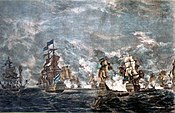| << | Today's featured articles for August 2020 | >> | ||||
|---|---|---|---|---|---|---|
| Su | Mo | Tu | We | Th | Fr | Sa |
| 1 | ||||||
| 2 | 3 | 4 | 5 | 6 | 7 | 8 |
| 9 | 10 | 11 | 12 | 13 | 14 | 15 |
| 16 | 17 | 18 | 19 | 20 | 21 | 22 |
| 23 | 24 | 25 | 26 | 27 | 28 | 29 |
| 30 | 31 | |||||
August 1
A boys' camping event at the site of the Brownsea Island Scout camp from 1 to 8 August 1907 is regarded as the origin of the worldwide Scouting movement. Held on Brownsea Island in Poole Harbour, southern England, it was organised by Robert Baden-Powell (pictured) to test his ideas for the book Scouting for Boys. Boys from different social backgrounds participated in activities themed around camping, observation, woodcraft, chivalry, lifesaving and patriotism. Up to the early 1930s, camping by Boy Scouts continued on Brownsea Island. In 1962, the island became a nature conservation area owned by the National Trust. The following year, Olave Baden-Powell reopened the island to the public, and in 1964 a formal 50-acre (200,000 m2) Scout campsite was established there. In 1973, a Jamboree was held on the island for 600 Scouts from seven nations. The worldwide centenary of Scouting was celebrated at the camp on 1 August 2007, the 100th anniversary of the start of the first encampment. (Full article...)
August 2
Trials of Mana is a 1995 action role-playing game developed and published by Square for the Super Famicom. The third installment in the Mana series, it follows three heroes in a high fantasy world as they attempt to claim the Mana Sword. The game features three lengthy main plotlines, a choice of six main characters, and a wide range of character classes and skills. It was designed by series creator Koichi Ishii, directed by veteran Square designer Hiromichi Tanaka (pictured), and produced by Tetsuhisa Tsuruzono, with artwork by Nobuteru Yūki and music by Hiroki Kikuta. The game was published in Japan, and an English fan translation appeared in 1999. It was first officially released in English in a 2017 port for the Nintendo Switch. Trials of Mana received considerable acclaim from reviewers for its graphics and gameplay, but some found the characters and plotlines clichéd. In April 2020, a 3D remake of the same name was released for Nintendo Switch, Microsoft Windows, and PlayStation 4. (Full article...)
August 3
Banksia sessilis is a large shrub or small tree in the family Proteaceae. First collected and described by Robert Brown in the early 19th century, the species grows widely throughout southwest Western Australia. It has prickly dark green leaves and dome-shaped cream-yellow flowerheads. Flowering from winter through to late spring, it provides a key source of food—both the nectar and the insects it attracts—for honeyeaters in the cooler months, and species diversity is reduced in areas where the plant does not occur. Several species of honeyeater, some species of native bee, and the European honey bee seek out and consume the nectar, while the long-billed black cockatoo and Australian ringneck eat the seed. The life cycle of B. sessilis is adapted to regular bushfires. Killed by fire and regenerating by seed afterwards, each shrub generally produces many flowerheads and a massive amount of seed. The species can recolonise disturbed areas, and may grow in thickets. (Full article...)
August 4
James Thompson (1789–1872) was an American surveyor who created the first plat of Chicago (pictured), completing it on August 4, 1830. Born in South Carolina, Thompson moved to Kaskaskia in southern Illinois as a young man and lived in the area for the rest of his life. He was hired to plat settlements at both ends of the proposed Illinois and Michigan Canal in northern Illinois, including Chicago at the eastern end. Before Thompson's plat fixed its location, the word "Chicago" had been used for various places around the southwestern shore of Lake Michigan. The plat named the streets in the area and allowed its residents to obtain legal title to their property. Chicago incorporated as a town in 1833 and as a city in 1837. In addition to his surveying work, Thompson served as a probate judge, county commissioner, and officer in the Illinois militia during the Black Hawk War. His grave, which was originally unmarked, was given a monument by the city in 1917. (Full article...)
August 5
The Eurasian crag martin (Ptyonoprogne rupestris) is a small swallow with brown upperparts, paler underparts, and a white-spotted square tail. It breeds in mountains in southern Eurasia and northwestern Africa. It is larger and has brighter tail spots than the three other species in its genus. Many European birds are resident, but northern and Asian populations winter in north Africa, the Middle East or India. This martin builds a half-cup mud nest lined with soft material under a cliff overhang or on a building, and the female lays two to five brown-blotched white eggs, incubated mainly by her although both parents feed the chicks. The martin feeds on insects that are caught as it flies near cliff faces or over open country. Adults and young may be hunted by birds of prey or corvids, and may host blood-sucking mites. With its large and expanding range and population there are no significant conservation concerns. (This article is part of a featured topic: Crag martins.)
August 6
The Russell family is a fictional family on the American soap opera Passions, which aired on NBC (1999–2007) and on DirecTV (2007–2008). Created by the soap's founder and head writer James E. Reilly, the family originally consisted of the married couple Eve and T. C. Russell and their children, Whitney and Simone. Later characters included Eve's vengeful adoptive sister Liz Sanbourne, Whitney's husband Chad Harris-Crane, Eve's aunt Irma Johnson, and Eve's child with Julian Crane, Vincent Clarkson, whose alter ego Valerie was played by Daphnée Duplaix (pictured). The cast was frequently nominated for NAACP Image Awards and featured prominently in a series of public service announcements for Black History Month in 2003. The show drew mixed critical attention for storylines involving Chad's affair with the intersex Vincent, but won the award for Outstanding Daily Drama at the GLAAD Media Awards in 2006 for its portrayal of Simone's sexuality. (This article is part of a featured topic: Russell family (Passions).)
August 7

The Second Silesian War (1744–1745) was a conflict between Prussia and Austria which confirmed Prussia's control of Silesia (now in south-western Poland). The war was fought mainly in Silesia, Bohemia, and Upper Saxony and formed one theatre of the wider War of the Austrian Succession. The Habsburg Monarchy's fortunes had improved since the end of the First Silesian War two years earlier. Prussia entered an alliance with Austria's enemies and rejoined the war, invading Habsburg Bohemia in mid-1744 to prevent a resurgent Austria from taking back Silesia. The war ended in a Prussian victory with the Treaty of Dresden in December 1745. Continuing conflict over Silesia would draw Austria and Prussia into the Third Silesian War a decade later. The Second Silesian War repeated the earlier defeat of the Habsburg Monarchy by a lesser German power and contributed to the Austria–Prussia rivalry that would shape German politics for more than a century. (This article is part of a featured topic: Silesian Wars.)
August 8
Cyril Bassett (1892–1983) was a New Zealand recipient of the Victoria Cross, the Commonwealth's highest combat award for gallantry at the time. He was the only soldier serving with the New Zealand Expeditionary Force in the Gallipoli campaign of the First World War to receive this award. Born in Auckland, Bassett was a bank worker when the First World War began. Posted to the New Zealand Divisional Signal Company of the Territorial Force as a sapper, he saw action on the opening day of the Gallipoli campaign. It was during the Battle of Chunuk Bair in August 1915 that he performed the actions that led to his award. Medically evacuated due to sickness shortly after the battle, he later served on the Western Front and finished the war as a second lieutenant. Recalled to active duty during the Second World War, he served in the Home Guard as a commander of signals in the Northern Military District, and was promoted to lieutenant colonel. (Full article...)
August 9
The 2nd Red Banner Army was a Soviet field army of World War II that was formed at Khabarovsk in the Soviet Far East in July 1938. It spent most of the war guarding the border in the Blagoveshchensk area, sending formations to the Eastern Front while undergoing several reorganizations. At the time of its creation, the unit was part of the army group known as the Far Eastern Front. The unit was designated as the 2nd Army and was led by corps commander Ivan Konev (pictured). It became the 2nd Independent Red Banner Army in September 1938 when the front was dissolved and its troops were split into two independent armies, and was redesignated in June 1940 as the 2nd Red Banner Army. In August 1945, the army fought in the Soviet invasion of Manchuria, capturing the Japanese fortified regions of Aihun and Sunwu adjacent to its sector of the border, and advancing into Manchuria to Qiqihar. The army was disbanded after the war in late 1945. (Full article...)
August 10

The Battle of Azaz was fought in 1030 in northern Syria between the Byzantine army, led by Emperor Romanos III Argyros, and the Mirdasid forces of the Emirate of Aleppo, under the personal command of Shibl al-Dawla Nasr. Romanos aimed to conquer Aleppo, long a flashpoint between Byzantium and its Arab neighbours. At the head of a large army and confident of success, the Emperor rejected Mirdasid peace offers, as well as his generals' advice to avoid action in the hot and dry Syrian summer. After the Byzantines camped near Azaz, the considerably smaller Mirdasid army, mostly Bedouin light cavalry, harassed the imperial camp and kept the heavier Byzantine troops from foraging. Romanos ordered his hungry and thirsty army to withdraw to Antioch, but the retreat soon collapsed into chaos, and the Byzantines were routed by the Arabs. Humiliated, Romanos returned to Constantinople, but his generals later managed to restore the Byzantine position, and Nasr concluded a treaty with Byzantium. (Full article...)
August 11
The MAX Yellow Line is a light rail service in Portland, Oregon, United States, operated by TriMet as part of the MAX Light Rail system. It connects North Portland to Portland City Center and Portland State University. Following years of failed attempts to construct the South/North Line between Clackamas County and Clark County, Washington, Portland business leaders and local residents persuaded TriMet to build a light rail extension from the city center to North Portland in 1999. The line began construction in 2001 and opened on May 1, 2004. As a source of funding, the city created an urban renewal area, which has been blamed for gentrifying historically black inner-city neighborhoods; about 10,000 people of color left Portland's Central City between 2000 and 2010. The line serves 17 stops and runs for approximately 21 hours daily with a minimum headway of 15 minutes during most of the day. (Full article...)
August 12
Nyuserre Ini was a pharaoh of Ancient Egypt, the sixth ruler of the Fifth Dynasty during the Old Kingdom period. The younger son of Neferirkare Kakai and queen Khentkaus II and the brother of the short-lived king Neferefre, Nyuserre probably lived in the second half of the 25th century BCE and reigned for more than two decades. He was succeeded by Menkauhor Kaiu, who could have been his nephew and a son of Neferefre. Nyuserre built three pyramids for himself and his queens and completed a further three for his father, mother and brother, all in the necropolis of Abusir. His temple dedicated to the sun god Ra was named Shesepibre or "Joy of the heart of Ra"; it is the largest such temple that survives from the Old Kingdom. He also completed the Nekhenre, the Sun Temple of Userkaf in Abu Gorab, and the valley temple of Menkaure in the Giza necropolis. The state-sponsored funerary cult established at Nyuserre's death lasted until the Twelfth Dynasty of the Middle Kingdom. (Full article...)
August 13

Westgate-on-Sea is a seaside town and civil parish in northeast Kent, England, with a population of 6,996 at the 2011 Census. It is within the Thanet local government district and borders the larger seaside resort of Margate. Its two sandy beaches have attracted tourists since the town's development in the 1860s from a small farming community. The local St Mildred's Bay was the site of a Royal Naval Air Service seaplane base, which defended the Thames Estuary coastal towns during World War I. The town is the subject of John Betjeman's poem "Westgate-on-Sea". Residents have included the 19th-century surgeon Erasmus Wilson and the artist William Quiller Orchardson, who painted several of his best-known pictures while living in Westgate-on-Sea. The British composer Arnold Cooke and Eton headmaster Anthony Chenevix-Trench attended local schools as children during the early 20th century. (Full article...)
August 14

Almost There is the first studio album by the American Christian rock band MercyMe (singer and drummer pictured), released on August 14, 2001, by INO Records. Characterizing it as contemporary worship and pop rock, music critics praised the album's songwriting, especially on "I Can Only Imagine", but gave its sound mixed reviews, ranging from "fresh" and "innovative" to derivative. CCM Magazine cited it in the 25th anniversary edition of their 100 Albums You Need to Own list. "Bless Me Indeed (Jabez's Song)" was released as the album's lead single, but it underperformed on the charts. The second single, "I Can Only Imagine", boosted sales for the album, and crossed over to mainstream radio in 2003. The album peaked at number 39 on the Billboard 200 and number one on the Billboard Christian Albums chart. Billboard ranked it as the fourth best-selling Christian album of 2000–2009 in the United States. Both the album and the single "I Can Only Imagine" have sold more than 3 million copies. (Full article...)
August 15

The surrender of Japan on September 2, 1945, brought the hostilities of World War II to a close. Together with the British Empire and China, the United States called for the unconditional surrender of the Japanese armed forces in the Potsdam Declaration on July 26, 1945. Japan's leaders privately made entreaties to the publicly neutral Soviet Union to mediate more favorable peace terms. On August 6, the United States detonated an atomic bomb over Hiroshima. On August 8, the Soviet Union invaded the Japanese puppet state of Manchukuo. Hours later, the United States dropped a second atomic bomb, on Nagasaki. Emperor Hirohito intervened and ordered that the Allies' terms for ending the war be accepted. Hirohito gave a recorded radio address transmitted across the Empire on August 15, announcing the surrender of Japan. The surrender ceremony was held aboard the battleship USS Missouri, at which officials from the Japanese government signed the Japanese Instrument of Surrender (pictured). (Full article...)
August 16
The 2019 World Snooker Championship was a professional snooker tournament that took place from 20 April to 6 May at the Crucible Theatre in Sheffield, England. It was the 43rd consecutive year the World Snooker Championship had been held at the Crucible, and the 20th and final ranking event of the 2018–19 season. The winner of the title was Judd Trump (pictured), who defeated John Higgins 18–9 in the final to claim his first World Championship, completing the Triple Crown. Defending champion Mark Williams lost 9–13 to David Gilbert in the second round. The tournament featured 100 century breaks, the highest number ever recorded at an official snooker event. The final match alone included 11 centuries, the most ever scored in the final of a ranking event. Higgins compiled the highest break, a 143, in his semifinal win over Gilbert. Shaun Murphy defeated Luo Honghao in the first round 10–0, the first whitewash at the World Championship since 1992. (Full article...)
August 17
The Daily News was a newspaper published in Los Angeles from 1923 to 1954, founded by Cornelius Vanderbilt IV as the first of several papers he wanted to manage. After quickly going into receivership, it was sold to Manchester Boddy, a local businessman. Boddy was able to make the newspaper succeed, and it remained profitable through the 1930s and 1940s, taking a mainstream Democratic perspective at a time when most Los Angeles newspapers supported the Republican Party. The newspaper began a steep decline in the late 1940s, continuing into the early 1950s. In the 1950 election, Boddy ran in both the Democratic and Republican primaries for the United States Senate. He finished a distant second in each, and lost interest in the newspaper. He sold his stake in the paper in 1952 and publication ceased in December 1954. The business was sold to the Chandler family, who merged it with their publication, the Los Angeles Mirror, firing all Daily News employees without severance pay. (Full article...)
August 18

The naval Battle of Lagos took place between a British fleet commanded by Sir Edward Boscawen and a French fleet under Jean-François de La Clue-Sabran over 18–19 August 1759 during the Seven Years' War. The French Mediterranean Fleet successfully passed through the Strait of Gibraltar, but was sighted by a British ship. The British fleet in Gibraltar was undergoing a major refit and left port amidst great confusion, with many ships delayed and sailing in a second squadron. Aware that he was pursued, La Clue changed course, but half of his ships failed to follow him in the dark. The British caught the French south west of the Gulf of Cádiz, fierce fighting ensued, and one French ship was captured. The British pursued the remaining six French ships overnight and two managed to escape. The four survivors attempted to shelter in neutral Portuguese waters near Lagos, but Boscawen violated that neutrality, capturing two of the ships and destroying the other two. (Full article...)
August 19
Hyborian War is a play-by-mail game set during Robert E. Howard's Hyborian Age in the world of Conan the Barbarian. The Origins Award–winning game, published by Reality Simulations, Inc., has been continuously available for play since 1985. The game’s genre is heroic fantasy, also known as sword and sorcery. Conan appears as a wandering hero whom players can employ until fortune takes him elsewhere. The game designer wove multiple aspects of Howard's stories into Hyborian War including diverse landscapes and cultures, grand armies, large-scale battles, powerful wizards, and courageous and heroic deeds. Gameplay is multifaceted and complex. Players choose from 36 kingdoms of small, medium, and large sizes, each with different victory conditions. A central focus of the game is conquest and expansion through military action and diplomacy. Intrigue, magic, and other tools of statecraft in a fantasy setting are available to players. The game retains an active player base in the 21st century. (Full article...)
August 20
George Tucker (August 20, 1775 – April 10, 1861) was an American lawyer, politician, author, and educator. He wrote the first in-depth biography of Thomas Jefferson, the first fictional account of colonial life in Virginia, and the four-volume History of the United States. Despite a social life which had been profligate, and at times even scandalous, at age 50 he was named Professor of Moral Philosophy at Jefferson’s newly founded University of Virginia and served in that post for twenty years. A son of the first mayor of Hamilton, Bermuda, he immigrated to Virginia at age 20, was educated at the College of William and Mary, and was admitted to the bar. He was elected in 1816 to the Virginia House of Delegates, then served in the United States House of Representatives from 1819 to 1825. In 1827 he wrote A Voyage to the Moon, one of America's earliest works of science fiction. He also produced diverse compositions on slavery, suffrage, morality, intracoastal navigation, wages, and banking. (Full article...)
August 21
Tropical Storm Ileana was a small tropical cyclone that affected western Mexico in early August 2018. The eleventh tropical cyclone and ninth named storm of the 2018 Pacific hurricane season, Ileana originated from a tropical wave that left the west coast of Africa and traveled across the Atlantic Ocean before crossing into the eastern Pacific Ocean early on August 4. The system began to strengthen on August 5, becoming Tropical Storm Ileana. On August 6, it began to develop an eyewall structure as it reached its peak intensity with winds of 65 mph (100 km/h) and a pressure of 998 mbar (29.47 inHg). The storm became intertwined with Hurricane John; the circulation of John disrupted Ileana before absorbing it on August 7. Paralleling the coast of Mexico for much of its existence, Ileana killed four people in Guerrero and four others in Chiapas. There was flooding in the Mexican states of Oaxaca, Guerrero, and Estado de México. (Full article...)
August 22
John W. Beschter (1763–1842) was a Catholic priest from the Duchy of Luxembourg who emigrated to the United States in 1807 to become a missionary of the Society of Jesus. He took up ministry in rural Pennsylvania, and was soon made the pastor of St. Mary's Church in Lancaster. As pastor, Beschter was praised by Archbishop John Carroll for ministering to Catholic congregations of three distinct ethnic and linguistic groups, and quieting a parochial dispute over the nationality and language of their pastor. In 1812, Beschter went to Maryland to become the master of novices at the new Jesuit novitiate in White Marsh. After two years, he returned to ministering in rural Pennsylvania and Maryland. He became the pastor of the German congregation of St. John the Evangelist in Baltimore, a position he held until 1828. The following year, he became the president of Georgetown College. After several months, he left the office, and returned to ministering in Paradise, Pennsylvania, where he lived out his final years. (Full article...)
August 23
The Parachute Jump is a defunct amusement ride on the Riegelmann Boardwalk in Coney Island, Brooklyn, New York City. Listed on the U.S. National Register of Historic Places and protected as a New York City designated landmark, it consists of a 250-foot-tall (76-meter), 170-short-ton (150-metric-ton) open-frame, steel parachute tower. The ride has twelve cantilever steel arms radiating from the top of the tower. When it was in operation, riders were belted into a suspended two-person canvas seat, lifted to the top, and dropped; a parachute and shock absorbers slowed their descent. The jump was the tallest structure built for the 1939 New York World's Fair at Flushing Meadows. The ride was moved to its current location in 1941, where it operated until the 1960s, when the Steeplechase amusement park shut down. After a period of neglect, the frame was restored and fitted with a light-show system in 2006. (Full article...)
August 24
The California Pacific International Exposition half dollar is a fifty-cent piece that was struck by the United States Bureau of the Mint in 1935 and 1936 as a commemorative coin. Its obverse depicts Minerva and other elements of the Seal of California; the reverse shows buildings from the California Pacific International Exposition (held 1935–1936), which the coin was issued to honor. Legislation for the half dollar moved through Congress without opposition in early 1935, and Robert I. Aitken was hired to design it. The San Francisco Mint produced 250,000 coins, but expected sales did not materialize. The Exposition Commission, left with over 180,000 pieces they could not sell, sought and obtained legislation authorizing new coins. Although there was a spike in prices for many commemorative coins in 1936, the Exposition Commission's new coins also sold poorly, and 150,000 pieces were returned to the Mint. (Full article...)
August 25
Castlevania: Dawn of Sorrow is a 2005 action-adventure video game, the first in the Castlevania series by Konami to be released on the Nintendo DS. It was written and produced by Koji Igarashi (pictured) and directed by Satoshi Kushibuchi. Incorporating many elements from its predecessor, Aria of Sorrow, it was commercially successful, selling more than 15,000 units in its first week in Japan and 164,000 in the United States within three months. The protagonist, Soma Cruz, manages to escape the fate of becoming the new Dracula with the help of allies. The game has platform and role-playing elements, with a dark, gothic atmosphere. It introduces a multiplayer mode and a "Magic Seal" system that requires the use of the DS stylus to draw a pattern to defeat enemies. The game received high scores from many video game publications and was considered one of the best games on the Nintendo DS for 2005. (This article is part of a featured topic: Castlevania: Aria of Sorrow.)
August 26

The Battle of Crécy was fought on 26 August 1346 in north-east France during the Hundred Years' War. It resulted in a victory for a greatly outnumbered English army led by King Edward III over the French led by King Philip VI and heavy loss of life among the French. The English prepared a defensive position on a hillside near Crécy-en-Ponthieu. After the French mercenary crossbowmen were routed by English longbowmen, French cavalry made repeated charges. They had to force their way uphill over muddy ground across pits dug by the English, while taking heavy casualties from the longbowmen. The ensuing hand-to-hand combat against the English men-at-arms was described as "murderous, without pity, cruel, and very horrible". The French charges continued late into the night, all with the same fierce fighting, until the French were repulsed. The battle established the effectiveness of the longbow as a dominant weapon on the Western European battlefield. (Full article...)
August 27
Operation PBFortune was a covert United States operation to overthrow the democratically elected Guatemalan president Jacobo Árbenz (pictured) in 1952. The operation was planned by the Central Intelligence Agency and authorized by President Harry Truman. It was motivated by US fears that Árbenz was being influenced by communists, and lobbied for by the United Fruit Company. The operation was planned with the support of Anastasio Somoza García, Rafael Leonidas Trujillo and Marcos Pérez Jiménez, the dictators of Nicaragua, the Dominican Republic and Venezuela, respectively. The plan involved providing weapons to the exiled Guatemalan military officer Carlos Castillo Armas, who was to lead an invasion from Nicaragua. US secretary of state Dean Acheson became concerned that the coup attempt would damage the image of the US and terminated the operation. Two years later, another covert CIA action, Operation PBSuccess, toppled the Árbenz government and ended the Guatemalan Revolution. (Full article...)
August 28

The Réunion ibis (Threskiornis solitarius) is an extinct bird formerly endemic to the Indian Ocean island of Réunion. Subfossil remains were found in 1974, and it was formally described in 1987. Early travellers described a white bird on Réunion that flew with difficulty, later assumed to refer to a white relative of the dodo. The ibis subfossil suggested that the tales referred to this bird instead. The ibis was mainly white, although its wing tips and plume feathers on its rear were black. The neck and legs were long, and the beak was relatively straight and short for an ibis. Similar to its extant relatives but more robust, it was about 65 cm (25 in) long. Subfossil wing-bones indicate that it had reduced flight capabilities. The diet of the ibis was invertebrates foraged from the soil. In the 17th century it lived only in mountainous areas, perhaps due to predation by introduced animals and hunting by humans for its tasty meat. These factors had driven the ibis to extinction by the early 18th century. (Full article...)
August 29
The Commissioner Government was a short-lived Serbian collaborationist puppet government established in the German-occupied territory of Serbia during World War II from 30 April to 29 August 1941. It was headed by Milan Aćimović (pictured) and was pro-German, anti-Semitic and anti-communist. The Aćimović government was merely an instrument of the German occupation regime, carrying out its orders within the occupied territory without appearing to moderate its policies. The government actively assisted the Germans in exploiting the population and the economy, and its members regarded their own participation in the Holocaust as "unpleasant but unavoidable". By mid-July, the Germans had decided that the Aćimović regime was incompetent, and the Commissioner Government resigned at the end of August. It was succeeded by the Government of National Salvation, in which Aćimović initially retained the interior portfolio. (Full article...)
August 30
House of Music is the fourth and final album by American R&B band Tony! Toni! Toné!, released in 1996 by Mercury Records. Bassist-vocalist Raphael Saadiq (pictured), guitarist-vocalist D'wayne Wiggins, and percussionist-keyboardist Timothy Christian Riley worked on its songs independently before recording them together as a group. While doing most of the production, Tony! Toni! Toné! emphasized musicianship and expanded on their previous work's traditional soul influences with live instrumentation and balladry. Music journalists have noted the album's incorporation of old-fashioned and modern sensibilities, themes of love and romance, and witty, sensitive lyrics. The album charted for 31 weeks on the Billboard 200 and sold over a million units in the United States. Critics praised the musicianship and songwriting, later deeming it a masterpiece of 1990s R&B. Despite its success, the group disbanded shortly after due to creative differences and Mercury's management of the album's short-lived marketing campaign. (Full article...)
August 31
New York State Route 175 is a west–east state highway located in Onondaga County, New York, in the United States. The 15.46-mile (24.88 km) route begins at an intersection with U.S. Route 20 east of the village of Skaneateles. It heads towards the northeast as Lee Mulroy Road, traversing farmland. It then passes through the village of Marcellus before ending at a junction with U.S. Route 11 in Syracuse. Designated in the 1930 renumbering of state highways in New York, the highway brought about an increase in population and development along its route. The section of Route 175 from downtown Marcellus to New York State Route 173 in Onondaga was built along the historical Seneca Turnpike, which was established in 1800 and dissolved in 1852. At 157 miles (253 km), the turnpike was the longest in the state at the time and was instrumental in the development of the villages of Skaneateles and Marcellus. (Full article...)






















